UNIT 9 HUMAN BIOLOGY LESSON 2课件(共44张,内嵌视频))-高中英语北师大版(2019)选择性必修第三册(共45张PPT)
文档属性
| 名称 | UNIT 9 HUMAN BIOLOGY LESSON 2课件(共44张,内嵌视频))-高中英语北师大版(2019)选择性必修第三册(共45张PPT) | 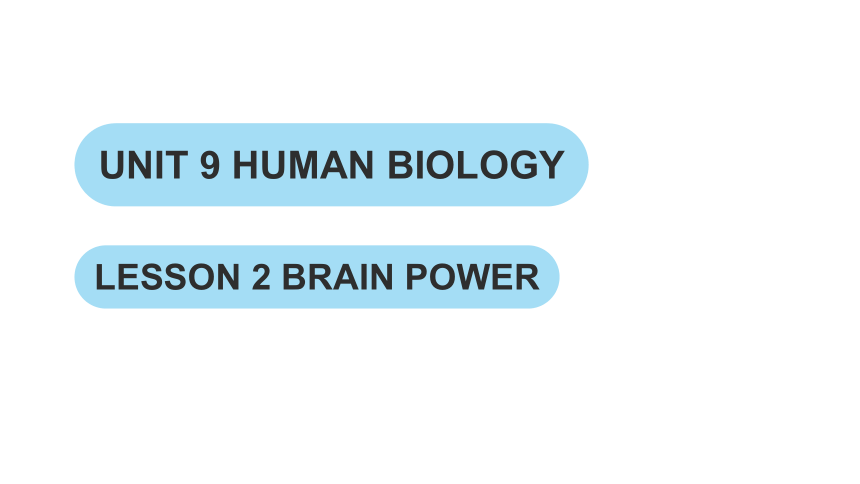 | |
| 格式 | pptx | ||
| 文件大小 | 39.2MB | ||
| 资源类型 | 教案 | ||
| 版本资源 | 北师大版(2019) | ||
| 科目 | 英语 | ||
| 更新时间 | 2025-04-03 22:17:16 | ||
图片预览


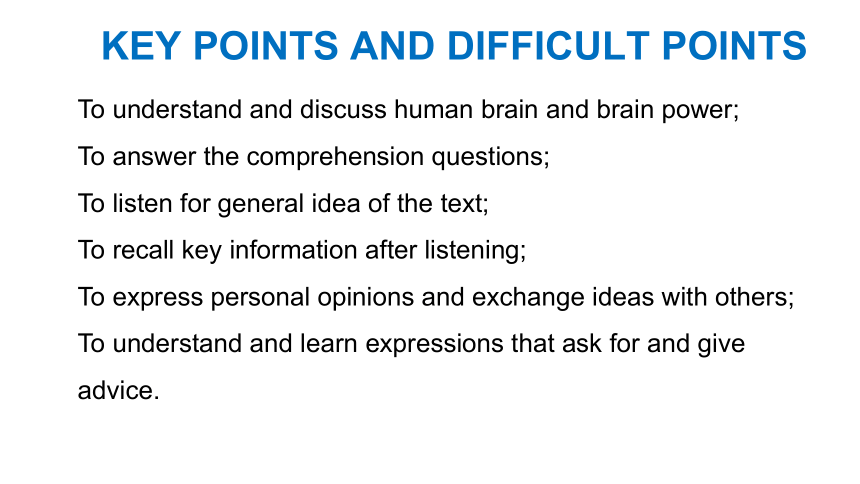
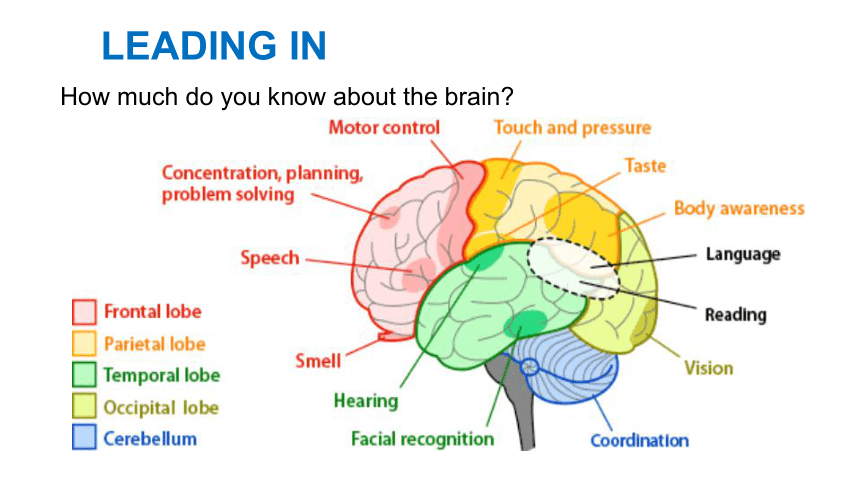
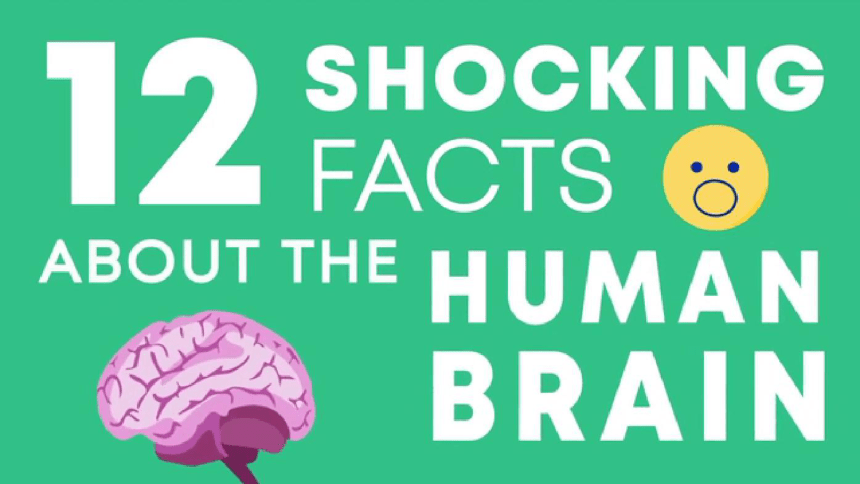
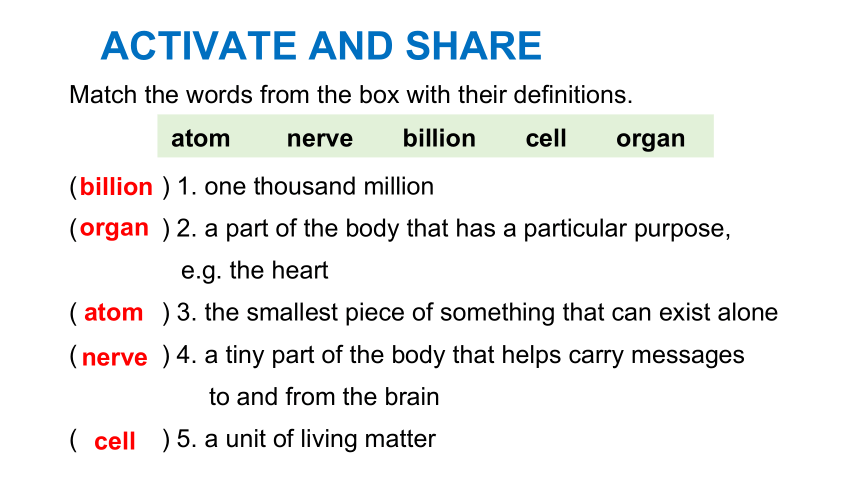
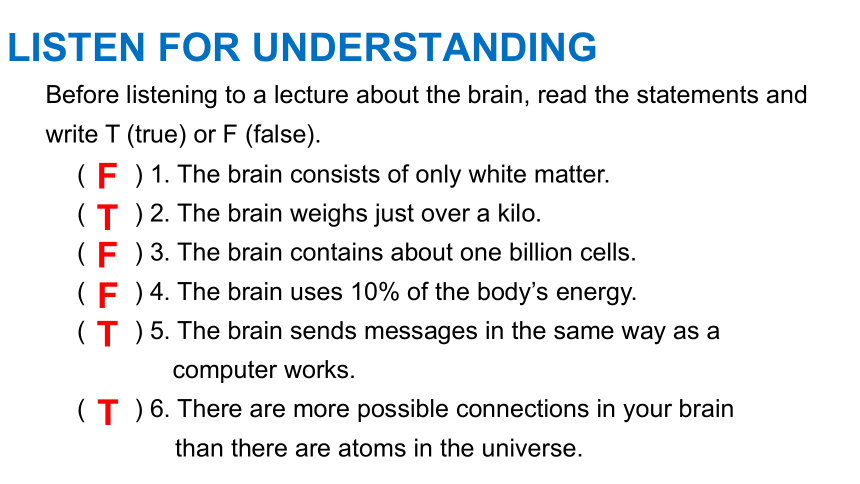
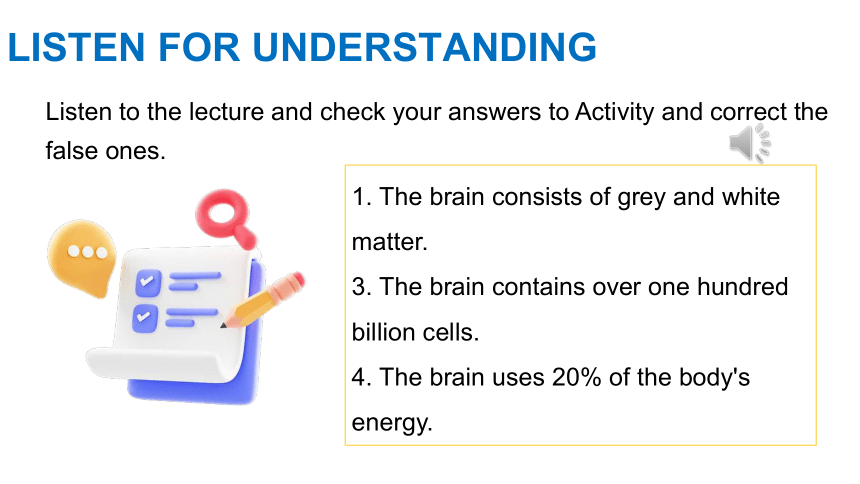
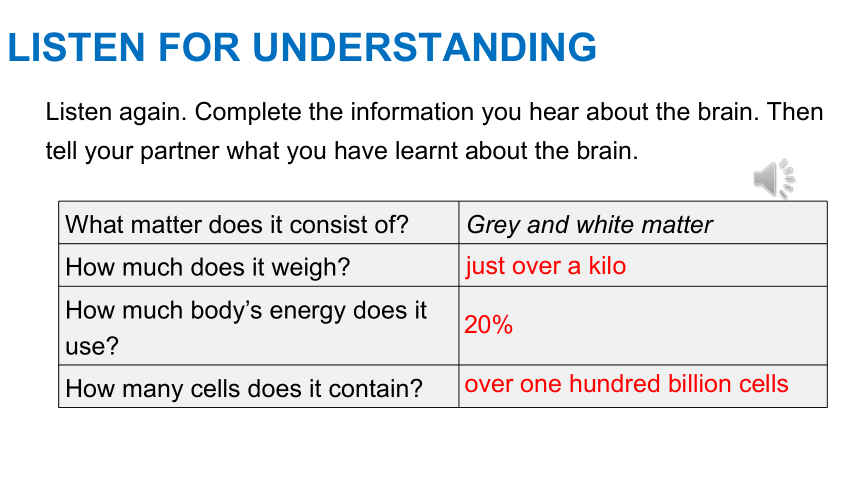
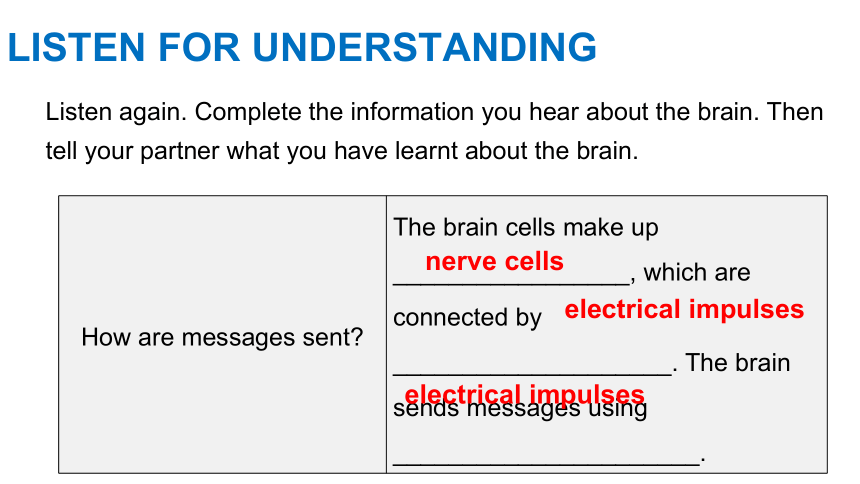
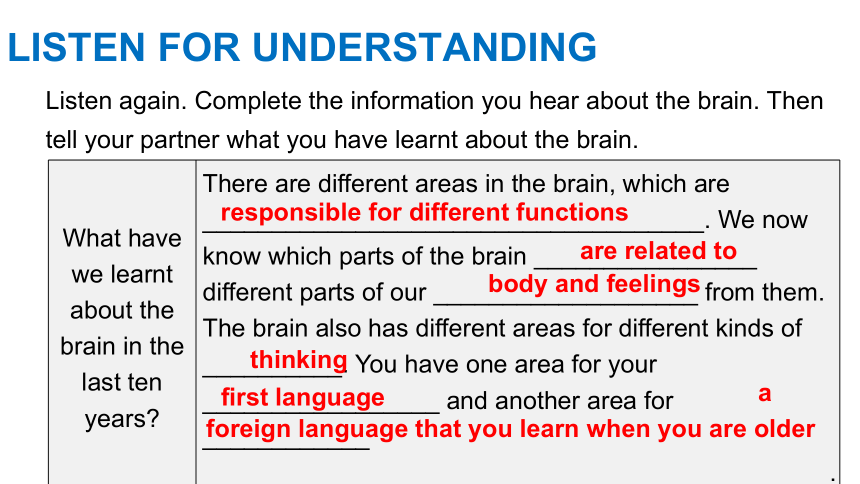
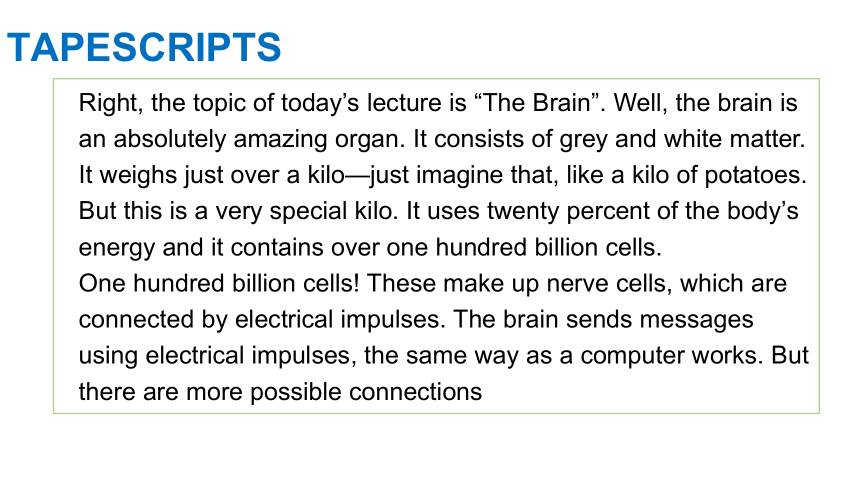
文档简介
(共44张PPT)
UNIT 9 HUMAN BIOLOGY
LESSON 2 BRAIN POWER
LEARNING OBJECTIVES
To listen and talk about human brain and brain power;
To listen for general understanding;
To listen for specific information and deep understanding;
To recall information previously heard;
To understand and learn words and expressions in context;
To compare personal opinions with the ideas of others;
To discuss expressions that ask for and give advice.
KEY POINTS AND DIFFICULT POINTS
To understand and discuss human brain and brain power;
To answer the comprehension questions;
To listen for general idea of the text;
To recall key information after listening;
To express personal opinions and exchange ideas with others;
To understand and learn expressions that ask for and give advice.
LEADING IN
How much do you know about the brain
ACTIVATE AND SHARE
Match the words from the box with their definitions.
atom nerve billion cell organ
( ) 1. one thousand million
( ) 2. a part of the body that has a particular purpose,
e.g. the heart
( ) 3. the smallest piece of something that can exist alone
( ) 4. a tiny part of the body that helps carry messages
to and from the brain
( ) 5. a unit of living matter
billion
organ
atom
nerve
cell
LISTEN FOR UNDERSTANDING
Before listening to a lecture about the brain, read the statements and write T (true) or F (false).
( ) 1. The brain consists of only white matter.
( ) 2. The brain weighs just over a kilo.
( ) 3. The brain contains about one billion cells.
( ) 4. The brain uses 10% of the body’s energy.
( ) 5. The brain sends messages in the same way as a
computer works.
( ) 6. There are more possible connections in your brain
than there are atoms in the universe.
F
T
F
F
T
T
LISTEN FOR UNDERSTANDING
Listen to the lecture and check your answers to Activity and correct the false ones.
1. The brain consists of grey and white matter.
3. The brain contains over one hundred billion cells.
4. The brain uses 20% of the body's energy.
LISTEN FOR UNDERSTANDING
Listen again. Complete the information you hear about the brain. Then tell your partner what you have learnt about the brain.
What matter does it consist of Grey and white matter
How much does it weigh
How much body’s energy does it use
How many cells does it contain
just over a kilo
20%
over one hundred billion cells
LISTEN FOR UNDERSTANDING
Listen again. Complete the information you hear about the brain. Then tell your partner what you have learnt about the brain.
How are messages sent The brain cells make up _________________, which are connected by ____________________. The brain sends messages using ______________________.
nerve cells
electrical impulses
electrical impulses
LISTEN FOR UNDERSTANDING
Listen again. Complete the information you hear about the brain. Then tell your partner what you have learnt about the brain.
What have we learnt about the brain in the last ten years There are different areas in the brain, which are ____________________________________. We now know which parts of the brain ________________ different parts of our ___________________ from them. The brain also has different areas for different kinds of __________. You have one area for your _________________ and another area for ____________ _____________________________________________.
responsible for different functions
are related to
body and feelings
thinking
first language
a foreign language that you learn when you are older
TAPESCRIPTS
Right, the topic of today’s lecture is “The Brain”. Well, the brain is an absolutely amazing organ. It consists of grey and white matter. It weighs just over a kilo—just imagine that, like a kilo of potatoes. But this is a very special kilo. It uses twenty percent of the body’s energy and it contains over one hundred billion cells.
One hundred billion cells! These make up nerve cells, which are connected by electrical impulses. The brain sends messages using electrical impulses, the same way as a computer works. But there are more possible connections
TAPESCRIPTS
in one brain than there are atoms in the universe. Just think about that again. There are more possible connections in your brain than there are atoms in the universe. Amazing, isn’t it Makes a normal computer look simple, doesn’t it
So, what do we know about this organ called “the brain” Scientists who study the brain have learnt a lot about it in the last ten years. Like explorers exploring the world, they’ve found that there are different areas in the brain and these areas are responsible for different functions. We now know which parts of the brain are related to different parts
TAPESCRIPTS
A good example of this can be seen in people who have lost an arm or a leg in an accident. Though they don’t have an arm or a leg, they can still have feelings from it, like pain. Incredible, isn’t it
You also have different areas for different kinds of thinking. For example, you have one area for your first language and another area for a foreign language that you learn when you are older. Interesting, isn’t it ...But even more interesting than locating different areas of the brain is...
LISTEN FOR UNDERSTANDING
Complete the summary with the words from the lecture.
The brain consists of 1. _____________________ matter. It weighs 2. _____________________. It uses 3. ______________ of the body’s energy. It contains over 4. ____________________________ which make up nerve cells. These nerve cells are connected by electrical impulses. There are more possible connections in one brain than
grey and white
just over a kilo
20%
one hundred billion cells
LISTEN FOR UNDERSTANDING
Complete the summary with the words from the lecture.
there are 5. _________________________. Scientists have mapped different areas of the brain that are responsible for 6. _______________________. There are also different areas for different types of thinking, such as learning your own language and learning a 7. ______________ language.
atoms in the universe
different functions
foreign
FOCUS ON FUNCTION:
ASKING FOR AND GIVING ADVICE
Listen to a student phone-in programme and complete the table.
What problem do they have What can they do
Anna:_________________________________________________ ___________________________ ___________________________
______________________________________________________
Memory isn’t as good as it used to be, so do brain exercises really work
challenge their brain with learning new things they are not good at
FOCUS ON FUNCTION:
ASKING FOR AND GIVING ADVICE
Listen to a student phone-in programme and complete the table.
What problem do they have What can they do
John:_________________________________________________ ________________________________________________________ ___________ on junk food, _____________________ of Omega-3 fats
Exams is coming up, so he wonders if there are certain foods that are good for the brain.
cut down
increase the intake
FOCUS ON FUNCTION:
ASKING FOR AND GIVING ADVICE
Listen to a student phone-in programme and complete the table.
What problem do they have What can they do
Bella:_________________________________________________ ________________________________________________________ ___________________________
______________________________________________________
Is there any particular kind of exercise that can improve the health of her brain
do exercise that is good for the heart, such as walking and running
FOCUS ON FUNCTION: AGREEING AND DISAGREEING
Listen and plete the Talk Builder.
Asking for and Giving Advice
Asking for Advice
1. _________________ try them
2. ______________________, Professor Kim
3. So what kind of activities _____________________
4. Is there any particular kind of exercise… _____________________
Should I
What’s your advice
What should I do
do you suggest
FOCUS ON FUNCTION: AGREEING AND DISAGREEING
Listen and plete the Talk Builder.
Asking for and Giving Advice
Giving Advice
1. _________________________ try learning a new language …
2. _________________________ is to cut down on junk food.
3. ______________________________ increase your intake of …
4. _________________________ do exercise that is good for your heart.
You could
One thing you can do
It might also be a good idea to
I advise you to
FOCUS ON FUNCTION: AGREEING AND DISAGREEING
Asking for Advice
Could I ask for your / some advice on / about ...
What do you think I should do
What would you do in this situation
Can you give me some advice / What’s your advice
Should I … / What should I do
What do you advise me to do
If you were me what would you do
I would appreciate your advice on / about ...
Could I ask what your reaction would be ...
FOCUS ON FUNCTION: AGREEING AND DISAGREEING
Asking for Advice
Do you happen to know …
I’m having problems with ...
Should I try them
What’s your advice, professor Kim
Could you please tell me how I can ...
Do you have any ideas / suggestions
So what kind of activities do you suggest
Is there any particular kind of exercise…
I was wondering if you can give me some advice on …
FOCUS ON FUNCTION: AGREEING AND DISAGREEING
Giving Advice
I think you should ...
Why don’t you ...
What / How about ...
If I were you, I would ...
Have you tried / considered ...
I (don’t) think you should / ought to ...
It might (not) be a good / bad idea to ...
One thing you could / should / have to do is ...
You’d better ...
I advise you to…
You ought (not) to ...
FOCUS ON FUNCTION: AGREEING AND DISAGREEING
Giving Advice
I suggest that you (should) …
It might be a good idea to …
I would recommend …
You could try learning a new language ...
One thing you can do is to cut down on junk food.
I advise you to do exercise that is good for your heart.
It might also be a good idea to increase your intake of …
Don’t hesitate to …
The way I see it is that …
If I were you, I would …
TAPESCRIPTS
(P = Presenter K = Professor Kim A = Anna J = John B = Bella)
P: Good morning and welcome to Healthy Living. This morning we’re here to discuss the brain. This is Professor Kim, a brain expert. Welcome, Professor.
K: Thank you for having me.
P: Let’s turn to our first caller now. Anna, are you there What would you like to ask Professor Kim
A: Oh hi, good morning. Yes. I’ve noticed that my memory isn’t as good as it used to be, and I’ve read about brain exercises—you know, crossword puzzles, games, quizzes, that kind of
TAPESCRIPTS
thing. But do they really work Should I try them
P: What’s your advice, Professor Kim
K: Well, the answer is yes and no. Puzzles and games are good for us to keep our brain active. However, to really exercise the brain, you need to challenge it. That means doing something new, something that perhaps you are not good at. This keeps the brain flexible and helps improve memory.
P: So what kinds of activities do you suggest
K: You could try learning a new language, learning to dance or learning to paint...anything that takes you outside your comfort zone.
TAPESCRIPTS
P: Great. Can we have our next caller, please Hi, John, what’s your question, please
J: Oh, hi. I’ve got some big exams coming up next month, and I was just wondering if there are certain foods that are good for the brain. What do you suggest
K: Great question. Your diet can definitely improve your brain health. If your brain has the correct fuel, it can work at its best. One thing you can do is to cut down on junk food. Foods that help the brain are natural foods: fruit, vegetables, and so on. It might also be a good idea to increase your intake of
TAPESCRIPTS
Omega-3 fats, which are an important brain food. These are found in food like oily fish and eggs.
P: Great advice. And finally, can we hear from Bella
B: Oh, hello. My question is about physical exercise. Is there any particular kind of exercise that can improve the health of my brain What should I do
K: I advise you to do exercise that is good for your heart, such as walking and running. These kinds of exercise increase the amount of oxygen in the blood, which is also good for the brain.
P: Fascinating stuff. Join us after the break ...
SPEAK
Search online in groups for more ways to increase brain power. Then give a short presentation to the class.
SPEAK
Search online in groups for more ways to increase brain power. Then give a short presentation to the class.
Eat healthy foods. They contain vitamins and minerals that are important for the nervous system.
Get a lot of playtime (exercise).
Wear a helmet when you ride your bike or play other sports that require head protection.
SPEAK
Search online in groups for more ways to increase brain power. Then give a short presentation to the class.
Don't drink alcohol, take drugs, or use tobacco.
Use your brain by doing challenging activities, such as puzzles, reading, playing music, making art, or anything else that gives the brain a workout!
VOCABULARY
1. exist
exist in… 存在于……之中 There exists... 有/ 存在……
existing adj. 现存的;现有的 existence n. 存在
bring…into existence 使……开始存在
in existence 现存的;现有的
come into existence 产生;存在
练习:Is there a possibility that life _________ on other planets
exists
VOCABULARY
2. contain
contain oneself 克制自己
contain one's feelings 抑制某人的感情
contain one's anger 抑制某人的怒火
contain one's excitement 控制某人的激动
A contains B (=B is inside A) B 在A 里面
container n. 容器
练习:Factory shops ___________ a wide range of furniture.
contain
VOCABULARY
3. connect
connect…to/ with/ and… 把……与……连接起来(具体含义)
connect…with… 把……与……联系起来(抽象含义)
be connected with 与……有联系/ 有关联
connection n. 联系;连接 in connection with 与……有关
have connection with 与……有联系
the connection between A and B A与B之间的联系
练习:First _____________ the printer to the computer.
connect
VOCABULARY
4. responsible
responsible adj. 负有责任的;负责的
be responsible for… 对……负责
responsibility n. 责任;职责 irresponsible adj. 不负责任的
take responsibility for sth. 承担某事的责任
练习:He takes the view that children are _________________ for their own actions.
responsible
VOCABULARY
5. make up
make up a team 组建一个团队 make up a story 编故事
make up an excuse 编借口
make up before the mirror 在镜子前化妆
make up for the loss 弥补损失
练习:They have to _________________ the time wasted this afternoon by working late tonight.
make up
VOCABULARY
6. cut down on
cut down 削减;砍倒 cut out 裁剪;删除
cut away 剪去;切除;砍掉 cut up 切碎
cut off 切掉;阻碍;中断 cut in 插嘴;插队
cut through/across 抄近路穿过
练习:As far as I am concerned, you should _________________ the fat you take in every day.
cut down on
LANGUAGE POINTS
1. Puzzles and games are good for us to keep our brain active.
“keep+宾语+宾语补足语”结构
We should keep the earth healthy while using its supply of natural resources.
利用自然资源的同时,我们应该使地球保持健康。
Keep your mouth shut and your eyes open.
闭上你的嘴,睁开你的眼睛。
He always kept his dog in the house when he was away on business.
当他出差时,他总是将狗关在房子里。
LANGUAGE POINTS
2. One thing you can do is to cut down on junk food.
be to do 结构
(1)“be to do”结构表示计划或安排中约定的或按职责、义务和要求必须去做的事或即将发生的动作。
(2)be to do常见于各种媒体用语中,用以宣布官方计划和决定。
(3)当主语是plan/ way/ purpose/ aim/ goal/ task等名词时,“be to do”结构是系表结构,be是系动词,to do作表语,说明主语的内容。
(4)若be to do结构中的do与其逻辑主语之间构成动宾关系,不定式要用被动形式,即be to be done。
LANGUAGE POINTS
2. One thing you can do is to cut down on junk food.
be to do 结构
The prime minister of this country is to visit China next month.
这个国家的首相将于下个月访问中国。
I think every business's goal is to make a profit.
我认为每个公司的目的都是获得利润。
His first book, which is adapted from a true story, is to be published next month.
他的第一本书将在下个月出版,这本书是根据一个真实的故事改编的。
PRACTICE
1. Students’ inner _______________ (motivate) is essential to their developments.
2. How do you _______________ (motivate) people to work hard and efficiently
3. This project is designed for training kids’ _______________ (logic) thinking.
4. Smooth traffic should be _______________ (guarantee).
motivation
motivate
logical
guaranteed
SUMMARY
Talk about and learn human brain and brain power;
Get general understanding and specific information;
Learn about and practice words and expressions in context;
Express personal opinions and exchange ideas with others;
Recall key information previously heard;
Learn about and practice expressions that ask for and give advice.
Thank you
UNIT 9 HUMAN BIOLOGY
LESSON 2 BRAIN POWER
LEARNING OBJECTIVES
To listen and talk about human brain and brain power;
To listen for general understanding;
To listen for specific information and deep understanding;
To recall information previously heard;
To understand and learn words and expressions in context;
To compare personal opinions with the ideas of others;
To discuss expressions that ask for and give advice.
KEY POINTS AND DIFFICULT POINTS
To understand and discuss human brain and brain power;
To answer the comprehension questions;
To listen for general idea of the text;
To recall key information after listening;
To express personal opinions and exchange ideas with others;
To understand and learn expressions that ask for and give advice.
LEADING IN
How much do you know about the brain
ACTIVATE AND SHARE
Match the words from the box with their definitions.
atom nerve billion cell organ
( ) 1. one thousand million
( ) 2. a part of the body that has a particular purpose,
e.g. the heart
( ) 3. the smallest piece of something that can exist alone
( ) 4. a tiny part of the body that helps carry messages
to and from the brain
( ) 5. a unit of living matter
billion
organ
atom
nerve
cell
LISTEN FOR UNDERSTANDING
Before listening to a lecture about the brain, read the statements and write T (true) or F (false).
( ) 1. The brain consists of only white matter.
( ) 2. The brain weighs just over a kilo.
( ) 3. The brain contains about one billion cells.
( ) 4. The brain uses 10% of the body’s energy.
( ) 5. The brain sends messages in the same way as a
computer works.
( ) 6. There are more possible connections in your brain
than there are atoms in the universe.
F
T
F
F
T
T
LISTEN FOR UNDERSTANDING
Listen to the lecture and check your answers to Activity and correct the false ones.
1. The brain consists of grey and white matter.
3. The brain contains over one hundred billion cells.
4. The brain uses 20% of the body's energy.
LISTEN FOR UNDERSTANDING
Listen again. Complete the information you hear about the brain. Then tell your partner what you have learnt about the brain.
What matter does it consist of Grey and white matter
How much does it weigh
How much body’s energy does it use
How many cells does it contain
just over a kilo
20%
over one hundred billion cells
LISTEN FOR UNDERSTANDING
Listen again. Complete the information you hear about the brain. Then tell your partner what you have learnt about the brain.
How are messages sent The brain cells make up _________________, which are connected by ____________________. The brain sends messages using ______________________.
nerve cells
electrical impulses
electrical impulses
LISTEN FOR UNDERSTANDING
Listen again. Complete the information you hear about the brain. Then tell your partner what you have learnt about the brain.
What have we learnt about the brain in the last ten years There are different areas in the brain, which are ____________________________________. We now know which parts of the brain ________________ different parts of our ___________________ from them. The brain also has different areas for different kinds of __________. You have one area for your _________________ and another area for ____________ _____________________________________________.
responsible for different functions
are related to
body and feelings
thinking
first language
a foreign language that you learn when you are older
TAPESCRIPTS
Right, the topic of today’s lecture is “The Brain”. Well, the brain is an absolutely amazing organ. It consists of grey and white matter. It weighs just over a kilo—just imagine that, like a kilo of potatoes. But this is a very special kilo. It uses twenty percent of the body’s energy and it contains over one hundred billion cells.
One hundred billion cells! These make up nerve cells, which are connected by electrical impulses. The brain sends messages using electrical impulses, the same way as a computer works. But there are more possible connections
TAPESCRIPTS
in one brain than there are atoms in the universe. Just think about that again. There are more possible connections in your brain than there are atoms in the universe. Amazing, isn’t it Makes a normal computer look simple, doesn’t it
So, what do we know about this organ called “the brain” Scientists who study the brain have learnt a lot about it in the last ten years. Like explorers exploring the world, they’ve found that there are different areas in the brain and these areas are responsible for different functions. We now know which parts of the brain are related to different parts
TAPESCRIPTS
A good example of this can be seen in people who have lost an arm or a leg in an accident. Though they don’t have an arm or a leg, they can still have feelings from it, like pain. Incredible, isn’t it
You also have different areas for different kinds of thinking. For example, you have one area for your first language and another area for a foreign language that you learn when you are older. Interesting, isn’t it ...But even more interesting than locating different areas of the brain is...
LISTEN FOR UNDERSTANDING
Complete the summary with the words from the lecture.
The brain consists of 1. _____________________ matter. It weighs 2. _____________________. It uses 3. ______________ of the body’s energy. It contains over 4. ____________________________ which make up nerve cells. These nerve cells are connected by electrical impulses. There are more possible connections in one brain than
grey and white
just over a kilo
20%
one hundred billion cells
LISTEN FOR UNDERSTANDING
Complete the summary with the words from the lecture.
there are 5. _________________________. Scientists have mapped different areas of the brain that are responsible for 6. _______________________. There are also different areas for different types of thinking, such as learning your own language and learning a 7. ______________ language.
atoms in the universe
different functions
foreign
FOCUS ON FUNCTION:
ASKING FOR AND GIVING ADVICE
Listen to a student phone-in programme and complete the table.
What problem do they have What can they do
Anna:_________________________________________________ ___________________________ ___________________________
______________________________________________________
Memory isn’t as good as it used to be, so do brain exercises really work
challenge their brain with learning new things they are not good at
FOCUS ON FUNCTION:
ASKING FOR AND GIVING ADVICE
Listen to a student phone-in programme and complete the table.
What problem do they have What can they do
John:_________________________________________________ ________________________________________________________ ___________ on junk food, _____________________ of Omega-3 fats
Exams is coming up, so he wonders if there are certain foods that are good for the brain.
cut down
increase the intake
FOCUS ON FUNCTION:
ASKING FOR AND GIVING ADVICE
Listen to a student phone-in programme and complete the table.
What problem do they have What can they do
Bella:_________________________________________________ ________________________________________________________ ___________________________
______________________________________________________
Is there any particular kind of exercise that can improve the health of her brain
do exercise that is good for the heart, such as walking and running
FOCUS ON FUNCTION: AGREEING AND DISAGREEING
Listen and plete the Talk Builder.
Asking for and Giving Advice
Asking for Advice
1. _________________ try them
2. ______________________, Professor Kim
3. So what kind of activities _____________________
4. Is there any particular kind of exercise… _____________________
Should I
What’s your advice
What should I do
do you suggest
FOCUS ON FUNCTION: AGREEING AND DISAGREEING
Listen and plete the Talk Builder.
Asking for and Giving Advice
Giving Advice
1. _________________________ try learning a new language …
2. _________________________ is to cut down on junk food.
3. ______________________________ increase your intake of …
4. _________________________ do exercise that is good for your heart.
You could
One thing you can do
It might also be a good idea to
I advise you to
FOCUS ON FUNCTION: AGREEING AND DISAGREEING
Asking for Advice
Could I ask for your / some advice on / about ...
What do you think I should do
What would you do in this situation
Can you give me some advice / What’s your advice
Should I … / What should I do
What do you advise me to do
If you were me what would you do
I would appreciate your advice on / about ...
Could I ask what your reaction would be ...
FOCUS ON FUNCTION: AGREEING AND DISAGREEING
Asking for Advice
Do you happen to know …
I’m having problems with ...
Should I try them
What’s your advice, professor Kim
Could you please tell me how I can ...
Do you have any ideas / suggestions
So what kind of activities do you suggest
Is there any particular kind of exercise…
I was wondering if you can give me some advice on …
FOCUS ON FUNCTION: AGREEING AND DISAGREEING
Giving Advice
I think you should ...
Why don’t you ...
What / How about ...
If I were you, I would ...
Have you tried / considered ...
I (don’t) think you should / ought to ...
It might (not) be a good / bad idea to ...
One thing you could / should / have to do is ...
You’d better ...
I advise you to…
You ought (not) to ...
FOCUS ON FUNCTION: AGREEING AND DISAGREEING
Giving Advice
I suggest that you (should) …
It might be a good idea to …
I would recommend …
You could try learning a new language ...
One thing you can do is to cut down on junk food.
I advise you to do exercise that is good for your heart.
It might also be a good idea to increase your intake of …
Don’t hesitate to …
The way I see it is that …
If I were you, I would …
TAPESCRIPTS
(P = Presenter K = Professor Kim A = Anna J = John B = Bella)
P: Good morning and welcome to Healthy Living. This morning we’re here to discuss the brain. This is Professor Kim, a brain expert. Welcome, Professor.
K: Thank you for having me.
P: Let’s turn to our first caller now. Anna, are you there What would you like to ask Professor Kim
A: Oh hi, good morning. Yes. I’ve noticed that my memory isn’t as good as it used to be, and I’ve read about brain exercises—you know, crossword puzzles, games, quizzes, that kind of
TAPESCRIPTS
thing. But do they really work Should I try them
P: What’s your advice, Professor Kim
K: Well, the answer is yes and no. Puzzles and games are good for us to keep our brain active. However, to really exercise the brain, you need to challenge it. That means doing something new, something that perhaps you are not good at. This keeps the brain flexible and helps improve memory.
P: So what kinds of activities do you suggest
K: You could try learning a new language, learning to dance or learning to paint...anything that takes you outside your comfort zone.
TAPESCRIPTS
P: Great. Can we have our next caller, please Hi, John, what’s your question, please
J: Oh, hi. I’ve got some big exams coming up next month, and I was just wondering if there are certain foods that are good for the brain. What do you suggest
K: Great question. Your diet can definitely improve your brain health. If your brain has the correct fuel, it can work at its best. One thing you can do is to cut down on junk food. Foods that help the brain are natural foods: fruit, vegetables, and so on. It might also be a good idea to increase your intake of
TAPESCRIPTS
Omega-3 fats, which are an important brain food. These are found in food like oily fish and eggs.
P: Great advice. And finally, can we hear from Bella
B: Oh, hello. My question is about physical exercise. Is there any particular kind of exercise that can improve the health of my brain What should I do
K: I advise you to do exercise that is good for your heart, such as walking and running. These kinds of exercise increase the amount of oxygen in the blood, which is also good for the brain.
P: Fascinating stuff. Join us after the break ...
SPEAK
Search online in groups for more ways to increase brain power. Then give a short presentation to the class.
SPEAK
Search online in groups for more ways to increase brain power. Then give a short presentation to the class.
Eat healthy foods. They contain vitamins and minerals that are important for the nervous system.
Get a lot of playtime (exercise).
Wear a helmet when you ride your bike or play other sports that require head protection.
SPEAK
Search online in groups for more ways to increase brain power. Then give a short presentation to the class.
Don't drink alcohol, take drugs, or use tobacco.
Use your brain by doing challenging activities, such as puzzles, reading, playing music, making art, or anything else that gives the brain a workout!
VOCABULARY
1. exist
exist in… 存在于……之中 There exists... 有/ 存在……
existing adj. 现存的;现有的 existence n. 存在
bring…into existence 使……开始存在
in existence 现存的;现有的
come into existence 产生;存在
练习:Is there a possibility that life _________ on other planets
exists
VOCABULARY
2. contain
contain oneself 克制自己
contain one's feelings 抑制某人的感情
contain one's anger 抑制某人的怒火
contain one's excitement 控制某人的激动
A contains B (=B is inside A) B 在A 里面
container n. 容器
练习:Factory shops ___________ a wide range of furniture.
contain
VOCABULARY
3. connect
connect…to/ with/ and… 把……与……连接起来(具体含义)
connect…with… 把……与……联系起来(抽象含义)
be connected with 与……有联系/ 有关联
connection n. 联系;连接 in connection with 与……有关
have connection with 与……有联系
the connection between A and B A与B之间的联系
练习:First _____________ the printer to the computer.
connect
VOCABULARY
4. responsible
responsible adj. 负有责任的;负责的
be responsible for… 对……负责
responsibility n. 责任;职责 irresponsible adj. 不负责任的
take responsibility for sth. 承担某事的责任
练习:He takes the view that children are _________________ for their own actions.
responsible
VOCABULARY
5. make up
make up a team 组建一个团队 make up a story 编故事
make up an excuse 编借口
make up before the mirror 在镜子前化妆
make up for the loss 弥补损失
练习:They have to _________________ the time wasted this afternoon by working late tonight.
make up
VOCABULARY
6. cut down on
cut down 削减;砍倒 cut out 裁剪;删除
cut away 剪去;切除;砍掉 cut up 切碎
cut off 切掉;阻碍;中断 cut in 插嘴;插队
cut through/across 抄近路穿过
练习:As far as I am concerned, you should _________________ the fat you take in every day.
cut down on
LANGUAGE POINTS
1. Puzzles and games are good for us to keep our brain active.
“keep+宾语+宾语补足语”结构
We should keep the earth healthy while using its supply of natural resources.
利用自然资源的同时,我们应该使地球保持健康。
Keep your mouth shut and your eyes open.
闭上你的嘴,睁开你的眼睛。
He always kept his dog in the house when he was away on business.
当他出差时,他总是将狗关在房子里。
LANGUAGE POINTS
2. One thing you can do is to cut down on junk food.
be to do 结构
(1)“be to do”结构表示计划或安排中约定的或按职责、义务和要求必须去做的事或即将发生的动作。
(2)be to do常见于各种媒体用语中,用以宣布官方计划和决定。
(3)当主语是plan/ way/ purpose/ aim/ goal/ task等名词时,“be to do”结构是系表结构,be是系动词,to do作表语,说明主语的内容。
(4)若be to do结构中的do与其逻辑主语之间构成动宾关系,不定式要用被动形式,即be to be done。
LANGUAGE POINTS
2. One thing you can do is to cut down on junk food.
be to do 结构
The prime minister of this country is to visit China next month.
这个国家的首相将于下个月访问中国。
I think every business's goal is to make a profit.
我认为每个公司的目的都是获得利润。
His first book, which is adapted from a true story, is to be published next month.
他的第一本书将在下个月出版,这本书是根据一个真实的故事改编的。
PRACTICE
1. Students’ inner _______________ (motivate) is essential to their developments.
2. How do you _______________ (motivate) people to work hard and efficiently
3. This project is designed for training kids’ _______________ (logic) thinking.
4. Smooth traffic should be _______________ (guarantee).
motivation
motivate
logical
guaranteed
SUMMARY
Talk about and learn human brain and brain power;
Get general understanding and specific information;
Learn about and practice words and expressions in context;
Express personal opinions and exchange ideas with others;
Recall key information previously heard;
Learn about and practice expressions that ask for and give advice.
Thank you
